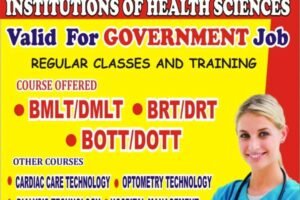Understanding the Role of Medical Laboratory Technologists
Medical laboratory technologists (MLTs) are vital to the healthcare system, providing essential diagnostic services that underpin effective patient care. Their role is multifaceted, involving the analysis of clinical samples to aid in diagnosing diseases, monitoring health conditions, and guiding treatment decisions. This article explores the responsibilities, skills, and impact of medical laboratory technologists, offering a comprehensive understanding of their crucial role in modern healthcare.

What Do Medical Laboratory Technologists Do?
1. Diagnostic Testing
Medical laboratory technologists perform a wide range of diagnostic tests on biological samples such as blood, urine, and tissue. These tests are essential for diagnosing medical conditions, determining the presence of diseases, and monitoring ongoing health issues. Common tests include blood cell counts, urine analysis, and microbiological cultures.
2. Sample Collection and Preparation
Technologists are responsible for the collection, preparation, and handling of patient samples. They ensure samples are correctly labeled, processed, and analyzed to maintain accuracy and reliability. Proper sample handling is crucial to avoid contamination or degradation that could affect test results.
3. Analyzing Test Results
Once samples are prepared, MLTs use sophisticated laboratory equipment and techniques to analyze them. They interpret the results, identifying abnormalities and patterns that assist physicians in diagnosing and treating patients. MLTs must be skilled in using various types of diagnostic machinery, such as spectrophotometers, microscopes, and automated analyzers.
4. Quality Control and Assurance
Ensuring the accuracy and reliability of test results is a core responsibility of medical laboratory technologists. They perform routine quality control procedures, calibrate equipment, and troubleshoot any issues that may arise. Maintaining high standards of accuracy and precision is essential for effective patient care and safety.
5. Collaboration with Healthcare Teams
MLTs work closely with other healthcare professionals, including physicians, nurses, and pathologists. They provide critical information and insights that aid in diagnosing diseases, planning treatments, and monitoring patient progress. Effective communication and teamwork are key aspects of their role.
Essential Skills and Qualifications
1. Technical Expertise
A thorough understanding of laboratory techniques and equipment is essential for medical laboratory technologists. They must be proficient in using diagnostic tools, conducting tests, and interpreting results accurately. Technical skills are developed through formal education and hands-on experience in clinical settings.
2. Attention to Detail
Accuracy is paramount in laboratory testing. MLTs must exhibit strong attention to detail to ensure that tests are conducted correctly and results are precise. Even minor errors can lead to incorrect diagnoses or ineffective treatments, underscoring the importance of meticulousness.
3. Analytical Thinking
Medical laboratory technologists must possess strong analytical skills to interpret complex test results and identify abnormalities. They must be able to recognize patterns, understand the implications of test findings, and make informed decisions based on their analyses.
4. Communication Skills
Effective communication is crucial for MLTs, as they often need to convey test results and collaborate with other healthcare professionals. They must be able to explain findings clearly and discuss potential implications with physicians and patients when necessary.
5. Problem-Solving Abilities
MLTs encounter various challenges, including troubleshooting equipment issues and addressing discrepancies in test results. Strong problem-solving skills are necessary to address these challenges and ensure that laboratory operations run smoothly.
The Impact of Medical Laboratory Technologists
1. Enhancing Diagnostic Accuracy
Medical laboratory technologists play a key role in improving diagnostic accuracy. By conducting precise tests and providing reliable results, they help physicians make informed decisions about patient care. Accurate diagnostics are critical for effective treatment planning and successful patient outcomes.
2. Supporting Disease Prevention and Management
MLTs contribute to disease prevention and management by conducting routine screenings and tests. Early detection of diseases such as diabetes, cancer, and infections can lead to timely intervention and better management of health conditions.
3. Advancing Medical Research
In addition to their clinical responsibilities, medical laboratory technologists may also be involved in research activities. They contribute to medical research by conducting experiments, analyzing data, and supporting studies that aim to advance medical knowledge and improve healthcare practices.
4. Ensuring Public Health and Safety
MLTs play a vital role in ensuring public health and safety by monitoring and controlling the spread of infectious diseases. Their work in analyzing samples from outbreaks and epidemics helps to identify pathogens and implement appropriate control measures.
Career Pathways and Opportunities
1. Clinical Laboratories
The majority of medical laboratory technologists work in clinical laboratories within hospitals, clinics, or diagnostic centers. These settings provide a wide range of diagnostic services, including routine testing, specialized analyses, and emergency testing.
2. Research Laboratories
Some MLTs work in research laboratories, where they support scientific studies and contribute to advancements in medical science. These roles may involve working on projects related to disease mechanisms, treatment development, and healthcare innovations.
3. Public Health Agencies
Medical laboratory technologists may also work in public health agencies, contributing to disease surveillance, outbreak investigations, and public health initiatives. Their work helps to ensure the health and safety of communities on a broader scale.
4. Teaching and Education
Experienced MLTs may choose to pursue careers in teaching and education, training future generations of medical laboratory professionals. This pathway involves teaching laboratory techniques, mentoring students, and contributing to curriculum development.
Education and Certification
1. Educational Requirements
To become a medical laboratory technologist, individuals typically need a Bachelor’s degree in Medical Laboratory Technology or a related field. Some programs offer specialized tracks or concentrations, such as clinical chemistry, microbiology, or hematology.
2. Certification and Licensure
In many regions, medical laboratory technologists are required to obtain certification from a professional board or regulatory body. Certification demonstrates competency and adherence to industry standards. Continuing education and professional development are often required to maintain certification and stay current with advancements in the field.
Conclusion
Medical laboratory technologists are essential to the healthcare system, providing crucial diagnostic services that support patient care, disease management, and medical research. Their roles encompass a range of responsibilities, from performing diagnostic tests and ensuring quality control to collaborating with healthcare teams and contributing to public health.
The skills and qualifications required for this profession underscore the importance of technical expertise, attention to detail, and analytical thinking. As the healthcare landscape continues to evolve, the role of medical laboratory technologists remains integral to enhancing diagnostic accuracy, advancing medical research, and ensuring public health and safety.
For those interested in a career that combines scientific knowledge with hands-on technical work, becoming a medical laboratory technologist offers a rewarding and impactful path in the healthcare field. By understanding their responsibilities and the significance of their work, one can appreciate the vital role MLTs play in improving patient outcomes and advancing medical science.

